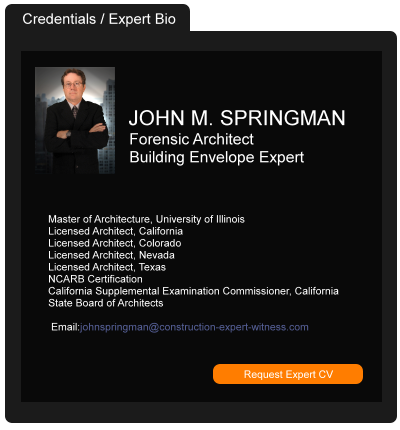Attorneys' Fee Clauses are Engraved Invitations to Sue
April 19, 2021 —
David M. McLain – Colorado Construction LitigationAs we start another trip around the sun, hopefully you are in the process of updating your form contracts, including purchase and sale agreements and express written warranties. Because the law and litigation landscape continually changes, it is a good practice to periodically update the forms you use in order to give yourself a fighting chance if and when the plaintiffs' attorneys come knocking on your door. As you engage in this process, I hope that you will take a critical look at whether your contracts include a prevailing party attorneys' fees clause and, if so, whether you should leave it in there.
In Colorado, parties are entitled to recover attorneys' fees only if provided for by statute or by contract. Historically, plaintiffs' attorneys relied on two statutes, the Colorado Consumer Protection Act and Colorado's Statutory Interest statute, to recover attorneys’ fees in construction defect cases. In 2003, the Colorado legislature capped treble damages and attorneys' fees under the Colorado Consumer Protection Act at $250,000, effectively restricting plaintiffs' attorneys from relying on the CCPA to recoup their attorneys' fees, especially in large cases. In 2008, the Colorado Supreme Court issued its decision in Goodyear v. Holmes, stating that plaintiffs can only claim prejudgment interest under Colorado's Statutory Interest statute, in cases where they have already spent money on repairs, not when they are suing for an estimate of what repairs will cost in the future. Without either the CCPA or the prejudgment interest statute to recover attorneys' fees, plaintiffs' attorneys most often now rely on the prevailing party attorney fee clause in contracts between the owner and builder, or in the declaration of covenants, conditions and restrictions in situations where a claim is prosecuted by an HOA.
Read the court decisionRead the full story...Reprinted courtesy of
David McLain, Higgins, Hopkins, McLain & RoswellMr. McLain may be contacted at
mclain@hhmrlaw.com
Illinois Legislature Passes Bill Allowing Punitive Damages In Most Wrongful Death Actions
June 05, 2023 —
John Hackett & Jarred Reed - Lewis BrisboisMadison County, Ill. (May 19, 2023) – On May 18, 2023, the Illinois legislature passed House Bill 0219, amending the Illinois Wrongful Death Act to allow for the recovery of punitive damages in wrongful death actions. The bill will soon be sent to the Governor’s desk for signature. If signed into law, the statutory change will allow heirs of decedents to recover punitive damages in wrongful death actions.
The proposed amendment to the Illinois Wrongful Death Act is underlined below:
Whenever the death of a person shall be caused by wrongful act, neglect or default, and the act, neglect or default is such as would, if death had not ensued, have entitled the party injured to maintain an action and recover damages including punitive damages when applicable, in respect thereof, then and in every such case the person who or company or corporation which would have been liable if death had not ensued, shall be liable to an action for damages, including punitive damages when applicable, notwithstanding the death of the person injured, and although the death shall have been caused under such circumstances as amount in law to felony. Nothing in this Section affects the applicability of Section 2-1115 of the Code of Civil Procedure or Section 2-102 or 2-213 of the Local Governmental and Governmental Employees Tort Immunity Act. Punitive damages are not available in action for healing art malpractice or legal practice or in an action against the State or unit of local government or an employee of a unit of local government in his or her official capacity. The changes made to this Section by this amendatory Act of the 103rd general Assembly apply to actions filed on or after the effective date of this amendatory Act.
Reprinted courtesy of
John Hackett, Lewis Brisbois and
Jarred Reed, Lewis Brisbois
Mr. Hackett may be contacted at John.Hackett@lewisbrisbois.com
Mr. Reed may be contacted at Jarred.Reed@lewisbrisbois.com
Read the court decisionRead the full story...Reprinted courtesy of
Economic Waste Doctrine and Construction Defects / Nonconforming Work
February 01, 2023 —
David Adelstein - Florida Construction Legal UpdatesI recently did a presentation on the economic waste doctrine. It is an applicable doctrine dealing with construction defects and nonconforming work. When it comes to construction defects and nonconforming work, EVERYTHING starts with your measure of damages. How are you going to prove your damages? Next, what evidence are you going to use to prove your damages? Or, what are the defenses and how do you prove those defenses to a construction defect and nonconforming work claim including the economic waste doctrine?
If you are interested in learning more, the below presentation can shed detail. However, don’t rely on the presentation in a vacuum. Work with knowledgeable construction counsel (like me!) that can best position your case whether you are the one proving construction defects and nonconforming work or the one defending against such a claim. This way, if you are arguing economic waste, you are not just throwing it out there, but you are arguing it to actually mean it!
Read the court decisionRead the full story...Reprinted courtesy of
David Adelstein, Kirwin Norris, P.A.Mr. Adelstein may be contacted at
dma@kirwinnorris.com
Colorado Court of Appeals to Rule on Arbitrability of an HOA's Construction Defect Claims
November 20, 2013 —
W. Berkeley Mann, Jr. — Higgins, Hopkins, McLain & Roswell, LLCOn October 24, 2013 the Colorado Court of Appeals granted a rare interlocutory appeal in a multi-family residential construction defect case. The Court of Appeals accepted the case ofTriple Crown at Observatory Village Association, Inc. v. Village Homes of Colorado, Inc.(2013 WL 5761028) as an interlocutory appeal after the parties briefed and obtained rulings from the trial court that compelled the case to binding arbitration in lieu of a jury trial on all issues. The appellate decision of October 24, 2013 did not decide the merits of the case, but discussed the issues to be decided in the eventual merits decision. The significance of the issues presented and the interlocutory nature of this appeal both make this case worth watching for further appellate proceedings.
The core issue in this appeal was the applicability of Colorado’s Uniform Arbitration Act (C.R.S. § 13-22-201, et seq.), based on recorded Declarations filed by the developer. The Declarations mandated that the HOA arbitrate any design/construction disputes with the developer. Immediately prior to suit, the Association sought to amend the Declarations in order to avoid the arbitration process for these claims. The interlocutory appellate issues resulted from the trial court’s order compelling the arbitration over the objections of the Association.
The trial court’s decision was based on a reading of the Colorado Revised Non-Profit Corporation Act (“CRNPC,” at C.R.S. § 7-127-107), which was found applicable to the Association.
Read the court decisionRead the full story...Reprinted courtesy of
W. Berkeley Mann, Jr.W. Berkeley Mann, Jr. can be contacted at
mann@hhmrlaw.com
New Case Alert: California Federal Court Allows Policy Stacking to Cover Continuous Injury
November 23, 2016 —
William S. Bennett - Saxe Doernberger & Vita, P.C.“Stacking” is a practice that is very favorable for policyholders, especially in environmental coverage cases involving extended pollution events. It allows a policyholder to combine the limits of multiple consecutive policies to cover continuous injury claims occurring over multiple policy periods. Without stacking, insurers can limit a policyholder’s recovery to a single policy limit.
The Eastern District of California recently decided that a policyholder could stack the limits of six consecutive policies, where the occurrence was a continuous injury spanning all six policy years. Among other rulings, the court determined that the plain language of the policy under dispute did not prevent stacking.
Read the court decisionRead the full story...Reprinted courtesy of
William S. Bennett, Saxe Doernberger & Vita, P.C.Mr. Bennett may be contacted at
wsb@sdvlaw.com
Final Furnishing Date is a Question of Fact
November 10, 2016 —
David Adelstein – Florida Construction Legal UpdatesConstruction liens need to be recorded within 90 days from the lienor’s final furnishing date on the project. This date is exclusive of punchlist or warranty work. The final furnishing date needs to be proven at trial to establish that the construction lien was timely recorded. If there is an evidentiary dispute as the final furnishing date (the contractor claims the date was “x” to establish the lien was timely and the owner claims the date was “y” to establish the lien was untimely), then the date is a question of fact to be determined by the jury.
For instance, in Best Drywall Services, Inc. v. Blasczyk, 2016 WL 6246701 (Fla. 2d DCA 2016), a contractor and owner entered into an oral agreement for a residential renovation project. The contractor recorded a construction lien after its final two invoices went unpaid. During trial, the contractor offered conflicting evidence as to when its final furnishing date on the project was. Numerous dates were offered in the record including dates that were more than 90 days prior to the date the contractor recorded its lien, meaning the lien was arguably untimely. As a result, the trial judge entered a directed verdict in favor of the owner and against the contractor on the contractor’s lien claim finding the lien was untimely recorded.
Read the court decisionRead the full story...Reprinted courtesy of
David Adelstein, Katz, Barron, Squitero, Faust, Friedberg, English & Allen, P.A.Mr. Adelstein may be contacted at
dma@katzbarron.com
National Lobbying Firm Opens Colorado Office, Strengthening Construction Defect Efforts
January 05, 2017 —
Beverley BevenFlorez-CDJ STAFFMichael Best Strategies, a national law and lobbying firm, has recently opened an office in Colorado. According to the Denver Business Journal, the firm “has recruited several big-name associates — a move that could give business leaders even more clout with the Legislature on issues such as construction-defects reform.”
One of the firm’s recruits, Jeff Thormodsgaard, the lead lobbyist in the recent movement to make it harder to sue condominium builders, told the Denver Business Journal, “The only change [in the construction-defects reform effort] is that we’re going to be adding more feet and more boots on the ground and more gravitas.”
Read the court decisionRead the full story...Reprinted courtesy of
South Africa Wants Payment From Colluding World Cup Builders
July 23, 2014 —
Kamlesh Bhuckory and Mike Cohen – BloombergSouth Africa’s government is putting pressure on construction companies to make further payments as punishment for rigging contracts to build stadiums for the 2010 FIFA Soccer World Cup and other projects.
Antitrust authorities fined 15 builders, including Murray & Roberts Holdings Ltd. (MUR) and Aveng Ltd., a total of 1.5 billion rand ($141 million) in June 2013, after a probe that spanned almost four years found they colluded to drive up prices.
“The 1.5 billion rand in penalties is not the end of the story with the construction industry,” Economic Development Minister Ebrahim Patel told lawmakers in Cape Town today. “We are now in discussion with the construction industry on a restitution package for their collusion and price fixing.”
Mr. Bhuckory may be contacted at kbhuckory@bloomberg.net; Mr. Cohen may be contacted at mcohen21@bloomberg.net
Read the court decisionRead the full story...Reprinted courtesy of
Kamlesh Bhuckory and Mike Cohen, Bloomberg


































































